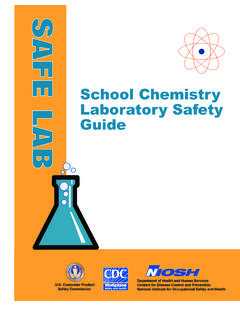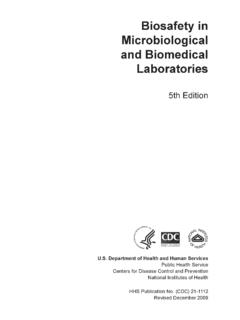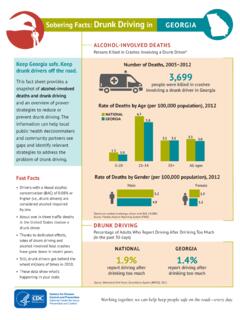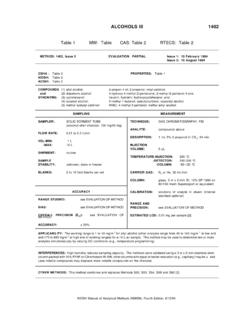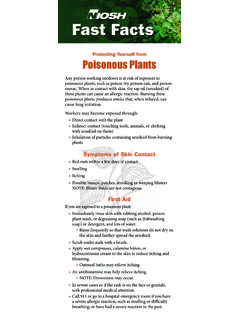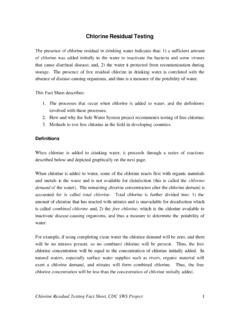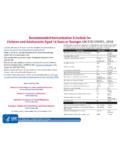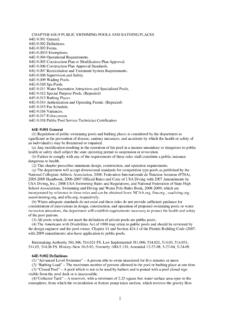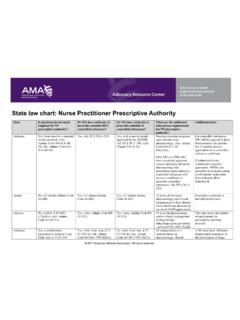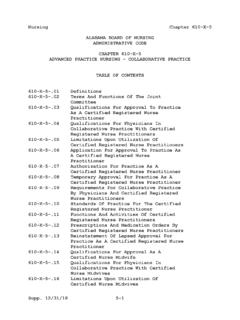Transcription of Prescription Drug Physical Examination Requirements
1 Prescription Drug Physical Examination Requirements The United States is in the midst of an unprecedented epidemic of Prescription drug overdose More than 41,000 people died of drug overdoses in 2011, and most of these deaths (22,810) were caused by overdoses involving Prescription Three-quarters of Prescription drug overdose deaths in 2011 (16,917) involved a Prescription opioid pain reliever (OPR), which is a drug derived from the opium poppy or synthetic versions of it such as oxycodone, hydrocodone, or The Prescription drug overdose epidemic has not affected all states equally, and overdose death rates vary widely across states. States have the primary responsibility to regulate and enforce Prescription drug practice. Although state laws are commonly used to prevent injuries, and their benefits have been demonstrated for a variety of injury types,4 little information is available on the effectiveness of state statutes and regulations designed to prevent Prescription drug abuse and diversion.
2 This menu is a first step in assessing laws on Physical exam Requirements by creating an inventory of state legal strategies in this domain. Introduction This resource includes Physical Examination laws if they require a licensed practitioner to examine the patient before prescribing a medication. In this menu, practitioner refers to a physician, dentist, pharmacist, physician s assistant, nurse practitioner , or any other person licensed, registered, or permitted to prescribe, dispense, distribute, or administer a controlled substance. Laws are included 1 For the purpose of this document, overdose death refers to death resulting from either intentional overdose or accidental overdose, which could be caused by a patient being given the wrong drug, taking the wrong drug in error, or taking too much of a drug inadvertently. CDC s National Center for Injury Prevention and Control also refers to overdose as a drug poisoning, which may or may not result in death.
3 2 Centers for Disease Control and Prevention, Wide-ranging Online Data for Epidemiologic Research (WONDER) Database (2012) 3 Id. 4 Schieber RA, Gilchrist J, & Sleet DA. Legislative and Regulatory Strategies to Reduce Childhood Injuries, 10 FUTURE CHILD. 1, 111 36 (2000). only if they expressly require an Examination or evaluation. Laws requiring a practitioner -patient relationship or use of a valid Prescription are included only if the definition of practitioner -patient relationship or valid Prescription expressly requires a physician Forty-one states6 and the District of Columbia have one or more laws that require a prescriber or dispenser to ensure that prescriptions for medications are based on an Examination of the States with these laws may require a Physical Examination as part of prescribing regulations, or may prohibit pharmacists and physicians from dispensing certain types of drugs if there is doubt the drugs were prescribed following a Physical exam.
4 Some states limit the applicability of the laws to certain drug types, apply laws only in certain circumstances, or contain exceptions to Examination Most states9 and the District of Columbia have multiple Physical Examination laws and thus fall under multiple categories. Type of Examination Required Most Examination laws10 require a Physical Examination as the basis for prescribing and dispensing a controlled substance. 5 Some states, such as Missouri, have come to define the patient- practitioner relationship to include a Physical Examination through judicial interpretation. See State v. Kane, 586 812 (App. 1979) (defining patient- practitioner as used in MO. ANN. STAT. to mean first making some attempt to determine Physical condition or health needs of person for whom he writes the Prescription . Id. Those statutes are not included in this report. 6 Alabama, Alaska, Arizona, Arkansas, California, Connecticut, Delaware, Florida, Georgia, Hawaii, Idaho, Indiana, Iowa, Kentucky, Louisiana, Maine, Maryland, Massachusetts, Minnesota, Mississippi, Missouri, Montana, Nebraska, Nevada, New Hampshire, New Jersey, New Mexico, North Carolina, North Dakota, Ohio, Oklahoma, Oregon, Pennsylvania, Rhode Island, South Carolina, Tennessee, Texas, Utah, Vermont, Virginia, and Washington.)
5 7 The nine states (Colorado, Illinois, Kansas, Michigan, New York, South Dakota, West Virginia, Wisconsin, and Wyoming) that do not have Physical Examination Requirements according to this assessment likely have a Physical Examination requirement that may be incorporated into state law through a general provision requiring adherence to medical professional and ethical standards. The research on which this menu is based was limited to express provisions in statute or regulation. 8 In this menu, the first effective dates of the specific provisions referenced are cited as [legal citation] (eff. [year]). Where dates were either not provided within the laws or were unclear due to multiple revisions, this fact is cited as [legal citation] (eff. date unclear, [estimated year]). 9 Thirty-seven states: Alabama, Alaska, Arizona, Arkansas, California, Connecticut, Delaware, Florida, Georgia, Hawaii, Idaho, Indiana, Iowa, Kentucky, Louisiana, Maine, Maryland, Minnesota, Mississippi, Missouri, Nebraska, Nevada, New Hampshire, New Jersey, New Mexico, North Carolina, North Dakota, Ohio, Oklahoma, Oregon, Pennsylvania, South Carolina, Tennessee, Texas, Vermont, Virginia, and Washington.
6 10 Thirty-four states and the District of Columbia. See, , ALA. ADMIN. CODE r. (eff. 2000); ALASKA ADMIN. CODE tit. 12, (eff. 2000); ARIZ. REV. STAT. ANN. 32-1401(27)(ss) (eff. 2000), -1501(31)(ww) (eff. 2003), 1854(48) (eff. 2000); ARK. CODE R. 2 (eff. date unclear); CONN. GEN. STAT. ANN. 20-613a (eff. 2005); MUN. REGS. tit. 17, 4616 (eff. 2012); DEL. CODE ANN. tit. 16, 4744(c)(1) (eff. 2008); FLA. STAT. (eff. 2011); GA. COMP. R. & REGS. (eff. date unclear); HAW. REV. STAT. ANN. 329-1 (eff. 2008); 844 IND. ADMIN. CODE 5-4-1 (eff. 2003); IOWA ADMIN. CODE (148,272C) (eff. date unclear); 201 KY. ADMIN. REGS. 8:540 (eff. 2012); LA. ADMIN. CODE tit. 46, pt. XLV, 6921 (eff. 1997); 02-313 ME. CODE 21, III (eff. 2010); MINN. R. (eff. 1988); 30-17-2635 MISS. CODE R. (eff. 2012); MO. REV. STAT. (eff. 2011); NEB. ADMIN. CODE 172, Ch. 90, 008 (eff. date unclear); NEV.
7 ADMIN. CODE (eff. date unclear); REV. STAT. ANN. 318-B:1 (eff. 2011); ADMIN. CODE 13 (a) (eff. 2003); CODE R. (eff. 2003); 21 ADMIN. CODE (b) (eff. 2003); CENT. CODE (eff. 2009); OHIO ADMIN. CODE 4731-11-03 (eff. date 2 Indiana [A] physician shall not prescribe, dispense, or otherwise provide, or cause to be provided, any controlled substance to a person who the physician has never personally physically examined and diagnosed.)
8 11 South Carolina Prior to prescribing a drug to an individual, a practitioner must personally perform and document an appropriate history and Physical Examination .. 12 Sixteen states13 and the District of Columbia14 have laws that require an Examination or evaluation that is deemed appropriate or some approximation of sufficient, instead of or in addition to the Physical Examination laws. California Requires an appropriate prior Examination . 15 Minnesota Requires an in-person Examination that is adequate to establish a diagnosis and identify underlying conditions and contraindications to treatment. 16 New Jersey When a practitioner prescribes a controlled substance, he or she must perform a Physical Examination including an assessment of Physical and psychological function, underlying or coexisting diseases or conditions, any history of substance abuse and the nature, frequency and severity of any pain.
9 17 In some states dispensers are allowed to dispense prescriptions only if the Prescription is prescribed by a practitioner who previously performed an adequate Examination . unclear); OKLA. ADMIN. CODE 435:10-7-11 (eff. 2005); 49 PA. CODE (b)(1) (eff. 1986); GEN. LAWS (eff. 1974); CODE ANN. 40-47-113 (eff. 1976); TENN. COMP. R. & REGS. (6)(e)(3)(i) (eff. 2001); 22 TEX. ADMIN. CODE (a)(1), (7) (eff. 2007); UTAH ADMIN. CODE r. 156-37 (eff. date unclear); 18 VA. ADMIN. CODE 85-20-25 (eff. date unclear); WASH. ADMIN. CODE 246-817-915 (eff. 2011). 11 844 IND. ADMIN. CODE 5-4-1 (eff. 2003). 12 CODE ANN. 40-47-113 (eff. 1976). 13 See, , CAL. BUS. & PROF. CODE 2242 (eff. 2000); CONN. AGENCIES REGS. 21a-326-1 (eff. 1984); IDAHO CODE. ANN. 54-1733; IOWA ADMIN. CODE (153) (eff. date unclear); LA. REV. STAT. ANN. 40 (eff. 2007); MD. CODE REGS. (eff. 2009); 234 MASS. CODE REGS.
10 (eff. date unclear); MINN. STAT. (eff. date unclear); 30-17-2635 MISS. CODE R. (eff. 2012); MO. CODE REGS. ANN. tit. 19 (eff. 2000); NEB. ADMIN. CODE 172, Ch. 56, 007 (eff. date unclear); NEV. ADMIN. CODE (eff. date unclear); ADMIN. CODE 13 (eff. date unclear); CODE R. (eff. date 2013); 22 TEX. ADMIN. CODE (eff. 2001); VT. STAT. ANN. tit. 18, 9361 (eff. 2012). 14 MUN. REGS. tIt. 22-B, (eff. 1986). 15 CAL. BUS. & PROF. CODE 2242 (eff. 2000). 16 MINN. STAT. ANN. Subd. 2(d), (e) (eff. date unclear). 17 ADMIN. CODE 13 (eff. date unclear). 3 Missouri [p]rescriptions processed by any.
